Ministry of Panchayati Raj
Union Minister of State Prof. S.P. Singh Baghel releases Report on “Status of Devolution to Panchayats in States” in New Delhi today
Devolution to Rural Local Bodies Increased from 39.9% to 43.9% between 2013-14 to 2021-22.
Funds devolved to Rural Local Bodies should be monitored to prevent corruption: Prof. S.P. Singh Baghel
Uttar Pradesh deserves Special Mention for remarkably improving its Accountability Framework: Prof. S. P. Singh Baghel
Karnataka Tops Devolution Ranking; Kerala and Tamil Nadu Bag Second & Third Spot respectively; Uttar Pradesh Jumps 10 Spots to reach Fifth Position
Posted On:
13 FEB 2025 8:36PM by PIB Delhi
The Report titled “Status of Devolution to Panchayats in States – An Indicative Evidence Based Ranking” was unveiled by Union Minister of State, Prof. S. P. Singh Baghel, Ministry of Panchayati Raj and Ministry of Fisheries, Animal Husbandry & Dairying, today in New Delhi. The event was attended by Shri Vivek Bharadwaj, Secretary, Ministry of Panchayati Raj, Shri Sushil Kumar Lohani, Additional Secretary, Ministry of Panchayati Raj, Shri Rajeev Singh Thakur, Advisor, NITI Aayog, Shri Alok Prem Nagar, Joint Secretary, Ministry of Panchayati Raj and other senior officers of the Ministry and faculty members of Indian Institute of Public Administration (IIPA), New Delhi.
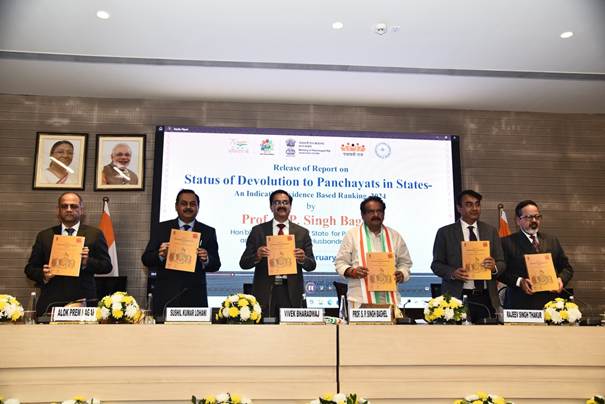
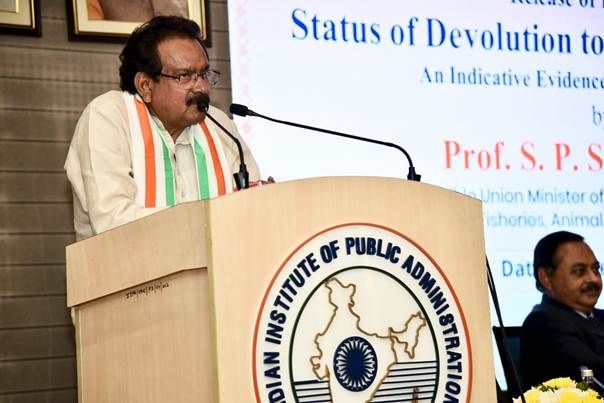
Addressing the participants at IIPA, Union Minister of State for Panchayati Raj Prof. S. P. Singh Baghel, in his address, stated that the Panchayat Devolution Index is crucial for the holistic, inclusive and sustainable development of India. It not only motivates states that have performed well but also encourages State Governments to create an environment that empowers Rural Local Bodies. Highlighting the remarkable progress of Uttar Pradesh, which has jumped from the 15th rank in the previous index to the 5th position now; he emphasized that if Uttar Pradesh grows, the nation progresses. He said “I am particularly proud to announce that the success story of Uttar Pradesh deserves special mention – its leap from 15th to 5th position is truly remarkable. The State of Uttar Pradesh has revolutionized its accountability framework through innovative transparency initiatives and robust anti-corruption measures.” Prof. Baghel urged all States to actively implement central government schemes for the welfare of society. He noted that Panchayats have always played a vital role in resolving conflicts at the local level. He further stated that Panchayat Bhawans should serve as centers for rural growth, as they have the potential to significantly increase the number of beneficiaries under central government schemes such as the Ayushman Bharat Yojana and other social sector schemes. Union Minister of State Prof. Baghel suggested that these Panchayat Bhawans could function as hubs for providing essential services like pensions, birth and death certificates, and other basic facilities in the villages.Prof. S.P. Singh Baghel also stressed upon the importance of monitoring the utilization of funds devolved to rural local bodies to prevent any financial irregularities or corruption.
Shri Vivek Bharadwaj, Secretary, Ministry of Panchayati Raj, addressing the gathering, called upon all States to take decisive steps toward empowering Panchayats. He stated that “This is not just about devolution of powers; it is about enabling our Panchayats to become vibrant centers of local governance in rural areas that can effectively contribute to India’s holistic, inclusive, and sustainable development.” Secretary, MoPR emphasized upon the remarkable progress in the Panchayati Raj arena over the last ten years, including digital transformation, Panchayat infrastructure (office buildings, computers, internet connectivity etc.), accounting and audits, and the conduct of regular panchayat elections.
This report marks a milestone in India’s journey toward empowering Panchayati Raj Institutions (PRIs) realizing the vision of ‘Local Government’ enshrined in the 73rd Constitutional Amendment and advancing Prime Minister Narendra Modi’s vision of Viksit Bharat through Gram Swaraj – echoing Mahatma Gandhi's dream of self-reliant village republics. The report provides an in-depth analysis at how well Panchayats are equipped to fulfill their Constitutional roles in each State and highlights the work still needed to be done to fully function as institutions of local self-government. Alongside indices that measure the overall performance of States in devolving powers and resources to Panchayats, sub-indices have been created for various dimensions and indicators. These sub-indices allow each State to see its relative ranking in different aspects of devolution.
States/UTs were ranked according to the overall Panchayat devolution index as well as by each of the following six dimensions:
(i) Framework
(ii) Functions
(iii) Finances
(iv) Functionaries
(v) Capacity Enhancement
(vi) Accountability
Highlights of the report:
- The latest report, prepared by IIPA, reveals that devolution has increased from 39.9% to 43.9% between the period 2013-14 to 2021-22.
- With the launch of the Rashtriya Gram Swaraj Abhiyan (RGSA) on 21.4.2018, the capacity enhancement component of the Index during this period has increased substantially from 44% to 54.6% i.e. an increase of more than 10%.
- During this period, the Government of India and the States have made tremendous efforts in providing physical infrastructure to Panchayati Raj Institutions (PRIs) and have recruited officials to strengthen rural Local Bodies, with the result that the component of the Index pertaining to functionaries has seen a substantial jump of more than 10% (from 39.6% to 50.9%).
(iv) Top 10 States in Panchayat Devolution Index (DI Score > 55) are
|
1
|
Karnataka
|
|
2
|
Kerala
|
|
3
|
Tamil Nadu
|
|
4
|
Maharashtra
|
|
5
|
Uttar Pradesh
|
|
6
|
Gujarat
|
|
7
|
Tripura
|
|
8
|
Rajasthan
|
|
9
|
West Bengal
|
|
10
|
Chattisgarh
|
With the score in between 50 and 55, Andhra Pradesh, Himachal Pradesh, Madhya Pradesh, and Odisha, fall under the category of 'medium scoring States, showcasing commendable performance across all sub-indicators.
(v) Success Stories Reflecting Transformative Change
Uttar Pradesh's remarkable journey from 15th to 5th place exemplifies the transformative power of focused governance reforms. The state has revolutionized its accountability framework through innovative transparency initiatives and robust anti-corruption measures, setting new standards in financial accountability and audit compliance. Similarly, Tripura's impressive leap from 13th to 7th place, particularly in revenue generation and fiscal management, demonstrates how smaller states are equally capable of achieving excellence in local governance.
(vi) Devolution Index: Overall:
The Index presents the overall scores and ranks for States/UTs on six identified dimensions. Based on the weighted aggregation of six dimensional sub-indices, the composite DI is computed for the States/UTs and the same is given below as Figure 1:
Figure 1: Devolution Index of Panchayats
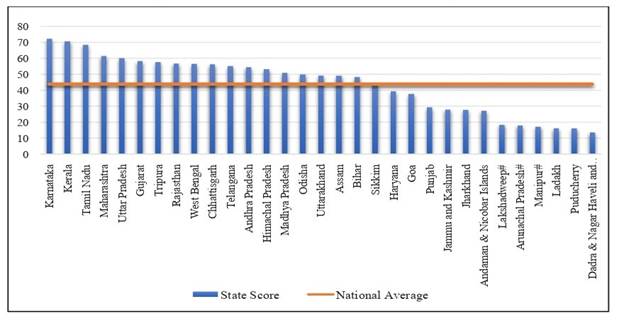
(vii) Devolution Indics: Dimensional
States have been ranked in each of the six dimensions:
Figure-2 : Framework: Kerala ranks first in this indicator related to the mandatory framework.
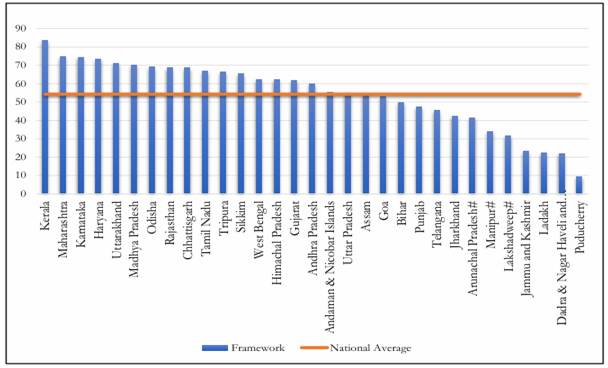
Figure-3:Functions: Tamil Nadu sets the benchmark in functional devolution.
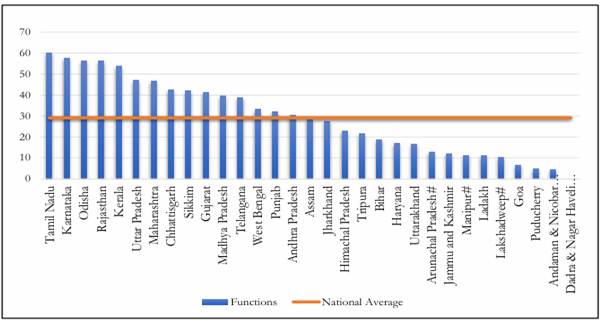
Figure-4:Finances: Karnataka demonstrates exemplary financial management practices.
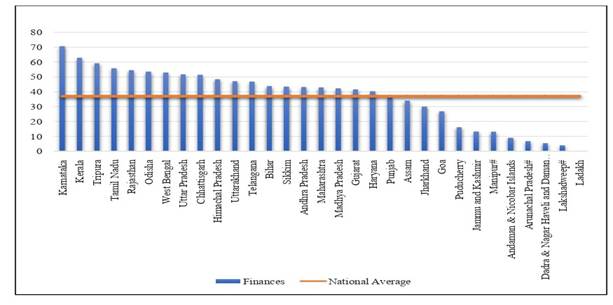
Figure-5:Functionaries: Gujarat leads in personnel management and capacity building.
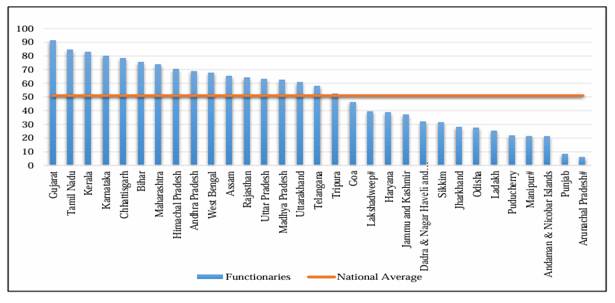
Figure-6:Capacity Enhancement: Telangana shows the way in institutional strengthening.
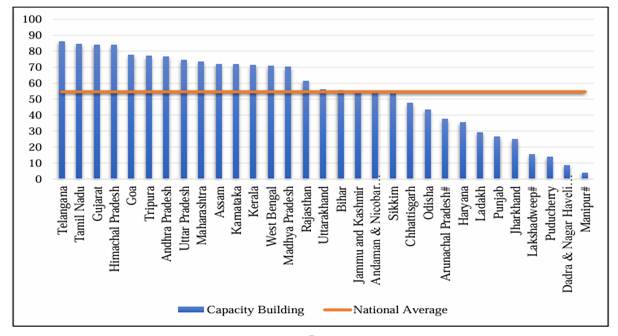
Figure-7:Accountability: Karnataka establishes new standards in transparency.
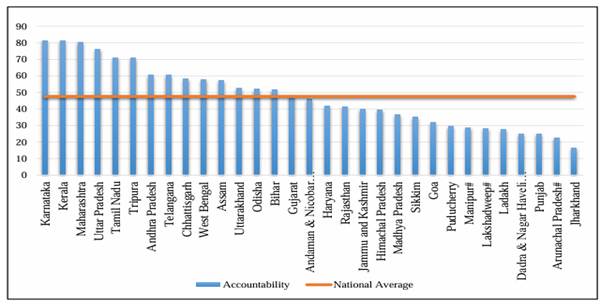
Over three decades ago, the 73rd Amendment granted constitutional status to Panchayats. This amendment introduced Part IX, titled 'The Panchayats”, which includes 16 articles addressing various aspects such as definitions, constitution, composition, elections, functioning, duration, disqualifications for membership, reservations for weaker sections, responsibilities, powers, and audit. While all States comply with the mandatory constitutional provisions regarding elections and reservations, there is significant variation in how powers and resources are devolved to Panchayats across different States and Union Territories. To encourage States to transfer powers and responsibilities to Panchayats and establish an accountability framework, the Ministry of Panchayati Raj, Government of India, ranks States and Union Territories based on their performance, as measured by a Devolution Index calculated by an independent institution. The Indian Institute of Public Administration (IIPA) had been responsible for conducting the study for 2023-24 and prepared a report comparing the devolution of functions, finances, and functionaries. The report also evaluated and compared frameworks for capacity enhancement and accountability.
This comprehensive assessment by IIPA not only celebrates the achievements of high-performing States but also provides a road map for others to enhance their rural governance frameworks. The spirit of competitive and cooperative federalism evident in these results promises an even brighter future for India's grassroots governance and rural development journey.
Click Below the following links:
- Summary of the Devolution Index Report 2024
- Devolution Index 2024 Report (Main)
- Devolution Index 2024 Report (Annexes)
****
Aditi Agrawal
(Release ID: 2102965)
Visitor Counter : 7023